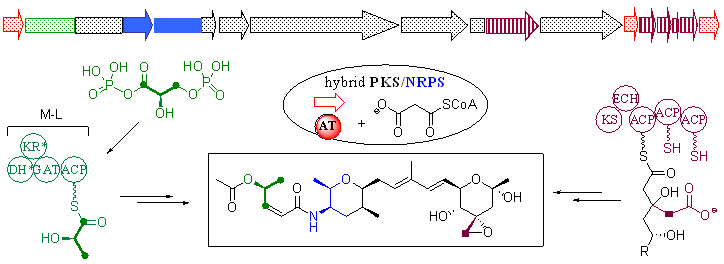Natural products, have always been one of the major sources of anticancer drugs. FR901464, an antitumor natural product, representing a new class of potent anticancer small molecules targeting spliceosome and inhibiting both splicing and nuclear retention of pre-mRNA, have drawn considerable interests for chemical synthesis, pharmaceutical development, and chemical biology. Recently, the researchers of State Key Laboratory of Bio-organic and Natural Product Chemistry at Shanghai Institute of Organic Chemistry, CAS, reported the biosynthetic gene cluster of FR901464, which revealed a complex polyketide synthase (PKS) system with several novel features (J. Am. Chem. Soc. 2011, 133, 2452-2462).
The FR901464 gene cluster was identified by degenerate primer PCR amplification of a gene encoding the 3-hydroxy-3-methylglutaryl-CoA synthase (HCS) postulated to be involved in the biosynthesis of a β-branched polyketide from Pseudomonas sp. No. 2663. This cluster consists of twenty open reading frames (ORFs) and was localized to 93-kb DNA segment, and its involvement in FR901464 biosynthesis was confirmed by gene inactivation and complementation. FR901464 is biosynthesized by a hybrid PKS/nonribosomal peptide synthetase (NRPS), HCS, and acyltransferases (AT)-less system. The PKS/NRPS modules feature unusual domain organization including multiple domain redundancy, inactivation, and tandem. Biochemical characterization of a glyceryl transferase and an acyl carrier protein (ACP) in the start module revealed that it incorporates D-1,3-bisphosphoglycerate, which is dephosphorylated and transferred to ACP as the starter unit. Furthermore, an oxidative Baeyer-Villiger reaction followed by chain release was postulated to form a pyran moiety. On the basis of in silico analysis and genetic and biochemical evidances, a biosynthetic pathway for FR901464 was proposed, which sets the stage to further investigate the complex PKS biochemically and engineer the biosynthetic machinery for the production of novel analogues.
 |


